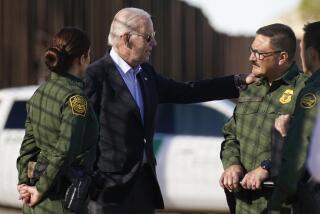Chile Lifts 2-Year-Old Curfew, Lists 227 Exiles It Will Allow to Return
- Share via
SANTIAGO, Chile — The military government lifted a two-year-old nighttime curfew Friday and issued a list of 227 people who will be allowed to return under a vow to virtually end the exiling of political opponents in three months.
President Augusto Pinochet announced on Wednesday that the government will allow the majority of Chile’s several thousand political exiles to return home. The 227 named were the first of the exiles to be cleared for return to Chile.
Although he did not say how many would be permitted to return, Pinochet said the measure would cover a majority of his exiled political opponents, totaling around 3,500 according to government figures.
End of State of Siege
In one of a series of steps apparently aimed at improving Santiago’s image abroad, he also said that a state of siege in effect since September, 1986, would expire next week.
The 227 names were issued by the Interior Ministry, which was instructed by Pinochet to complete the paperwork for their return within 90 days.
The 71-year-old president said only a “small minority” considered a serious threat to national security would continue to be barred.
Curfew Suspended
Meanwhile, security authorities announced that the curfew is being suspended immediately in Santiago and the coastal province of San Antonio, the only regions in which it was still being applied.
The curfew, between 2 a.m. and 5 a.m., had been in force since November, 1984.
Foreign Minister Jaime de Valle said he believed the government’s various new steps would have an impact on its international standing.
“I believe that . . . nearly all the arguments used against Chile in international forums have been answered . . . . We are going into the new year in a very different position,” he said.
De Valle said the decisions displayed the country’s “determined advance towards full democracy . . . along with measures normally related to human rights.”
New Year’s Eve Speech
In a year-end address on Wednesday, Pinochet announced the policy on the return of exiles and the imminent end of the state of siege, imposed in September only hours after an attempt on the president’s life.
Pinochet, in power since a 1973 coup, also repeated promises to produce a long-proposed law legalizing non-Marxist political parties early this year.
He said he was acting out of a desire to promote national unity and diminish “hate, divisions and anger.”
State Department spokeswoman Phyllis Oakley said, “We welcome the announced reduction in the list of Chilean exiles and hope it will be followed by greater relaxation of these restrictions as had been promised by the Chilean government.”
No U.S. Comment on Siege Move
Oakley declined comment on the planned expiry of the state of siege, saying she did not have complete information.
Chile’s image has been tarnished by repeated accusations of human rights violations.
Pope John Paul II, who has frequently spoken out against systems of exile, is due to make the first papal visit to Chile in April, and the government also faces the possibility of fresh condemnation when the U.N. Human Rights Commission holds it annual meeting in Geneva next month.
“If I were in government, I would have tried to take a couple of preemptive strikes to ward off the criticism,” one European diplomat said.
The decision to bring the system of exile to a virtual end was welcomed by church leaders.
‘Thanks to God’
“I give thanks to God because justice is finally being done to a large group of Chileans,” said Bishop Tomas Gonzalez from Chile’s southernmost province of Magallanes.
Diplomats and human rights workers hailed the move but said the entire exile system should be ended.
“It is very positive. But the government is still saying it has the right to decide who can live in the country,” said German Molina, national secretary of the Chilean Human Rights Commission.
Pinochet said the state of siege, first imposed for 90 days and then renewed for one month in Santiago, had achieved its purpose.
The attempt on the president’s life, the first he had suffered, was claimed by the Manuel Rodriguez Patriotic Front.
Five Bodyguards Died
Five alleged members of the front have been arrested and charged with taking part in the attack, in which five of Pinochet’s bodyguards died.
Five opposition magazines have been prevented from publishing under state of siege regulations, but all government opponents rounded up in the early days of the measure have been released.
The lifting of the state of siege still leaves the military with a powerful battery of measures that it can apply against its opponents, diplomats said.
A state of emergency, applied with only a brief interruption since the 1973 coup, remains in force, giving the government wide powers to arrest opponents and restrict information, movement and assembly.
More to Read
Sign up for Essential California
The most important California stories and recommendations in your inbox every morning.
You may occasionally receive promotional content from the Los Angeles Times.













